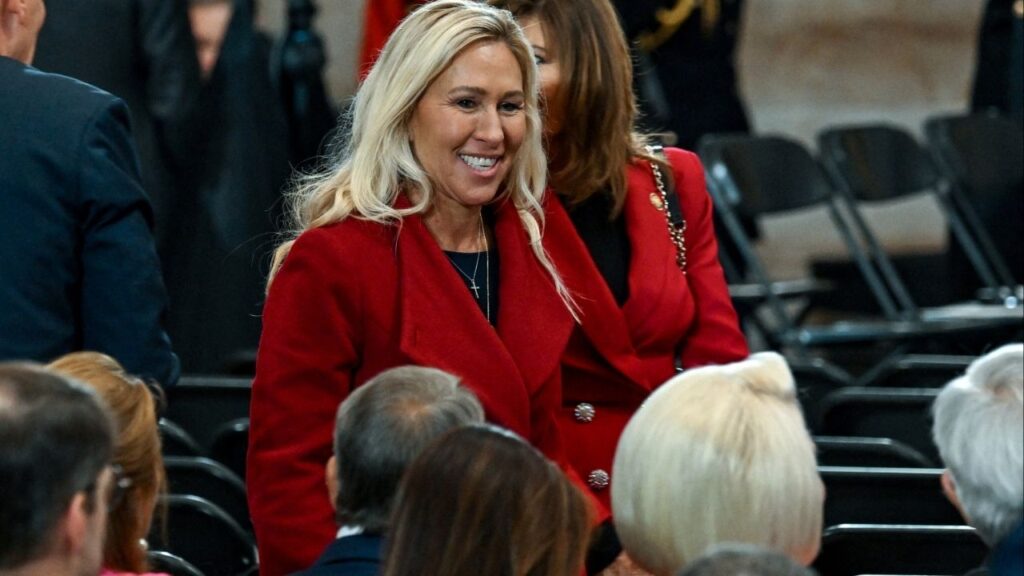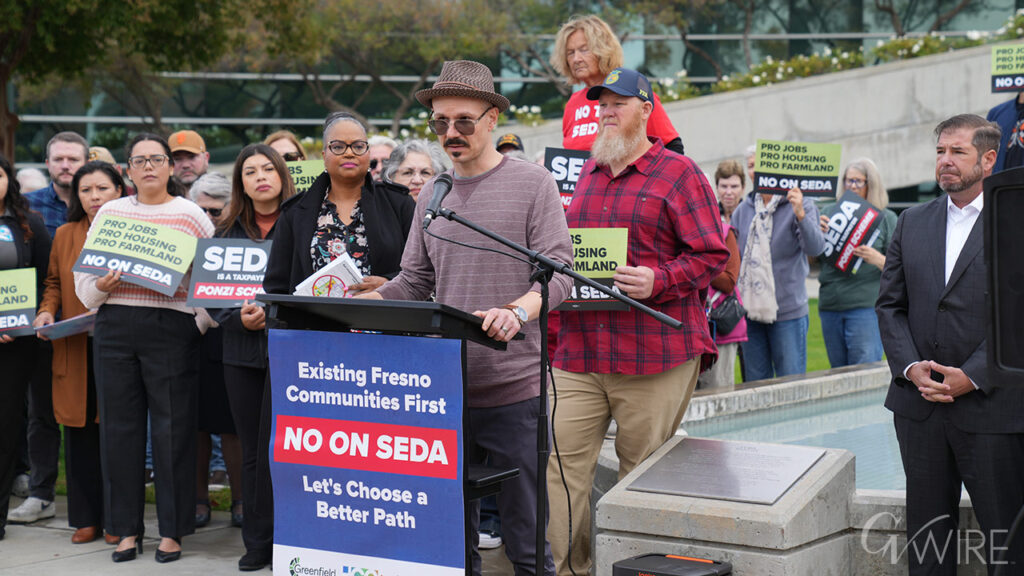Rep. Rashida Tlaib holds up sign that reads "War Criminal" at Prime Minister Netanyahu's address to the US Congress on July 24, 2024. (Video Screenshot)

- Netanyahu faces crucial choices that could reshape U.S.-Israeli relations and Middle East dynamics.
- He must decide on a cease-fire with Hamas and a U.S.-Saudi-Israeli defense pact.
- Success could isolate Iran and pave the way for a Palestinian state.
Share
|
Getting your Trinity Audio player ready...
|
By Thomas L. Friedman on July 23, 2024.

Thomas L. Friedman
Opinion
Netanyahu’s Address
When I think about Israeli Prime Minister Benjamin Netanyahu’s address on Wednesday to a joint meeting of Congress, the first thing that comes to mind is the famous dictum “There are decades where nothing happens; and there are weeks where decades happen.” This is one of those weeks for Israel, America and the Middle East. A decade is teed up to happen — or not.
By pure accident, a set of profound war-or-peace tipping points have intersected this week that Tolstoy could not have made up. In the wake of President Joe Biden’s decision on Sunday to put his country ahead of his personal interests and cede power, Netanyahu — who has consistently put his personal interests ahead of his country’s to hold power — comes to Washington. And he comes facing two intertwined decisions that could provide Biden a huge foreign policy legacy and transform Netanyahu’s own legacy at the same time — or not.
Related Story: FACT FOCUS: A Look at Netanyahu’s Claims About Israel, Hamas and Iran ...
It’s as if the writers of “The West Wing” on NBC decided to collaborate on a script with the writers of “Fauda” on Netflix — and they’re now wrestling over whether to make a series about a new dawn or a new tragedy for America, Israel and the Arab world.
Thanks to the frequent-flyer travels since the Hamas attack on Israel on Oct. 7 of Biden, Secretary of State Antony Blinken, CIA Director Bill Burns and National Security Adviser Jake Sullivan, Netanyahu has two huge decisions sitting on his desk that could both pause the fighting in the Gaza Strip — and Lebanon — and lay the groundwork for a new U.S.-Arab-Israeli alliance against Iran.
Reshaping the Middle East
We are talking about the most consequential opportunity to reshape the Middle East since the Camp David agreements in the 1970s.
The first decision, though, requires Netanyahu to agree — right now — on a phased-cease-fire deal tentatively reached by U.S., Israeli, Qatari, Egyptian and Hamas negotiators that would trigger, in Phase 1, a six-week pause in the fighting in Gaza and the return of 33 Israeli hostages (some dead, some alive), including 11 women, in return for several hundred Palestinian prisoners in Israeli jails.
Related Story: Netanyahu Defends War in Gaza and Denounces Protesters In Fiery Speech to ...
In June, Netanyahu signaled his support for the basic parameters of this deal but since then has been toying around with certain aspects of it — dialing up and down their security importance to an Israeli public that does not always know the details — to buy himself time before signing off and possibly alienating the far-right extremists in his Cabinet, to whom he has promised a “total victory” over Hamas in Gaza.
Netanyahu Focusing on Security Issues
Netanyahu has focused on three security issues. One is the movement of Gaza civilians from southern Gaza, where they have taken refuge, to northern Gaza City, where many had their homes. Netanyahu had been seeking some kind of inspection system to prevent armed Hamas members from flowing back to the north, but with tens of thousands of people who will be moving, the Israeli army knows that it will be impossible to prevent a few hundred Hamas fighters from coming back (plenty are there already) and believes it can deal with them later.
The second issue is the control of the border between Gaza and Egypt, where Hamas built tunnels and smuggling routes from which it brought in many weapons. The Israeli army, according to a source, believes it has identified or destroyed most of the tunnels and that Israel and Egypt can ensure no one is passing above ground for now — and they can build a more permanent barrier over time. The last issue is the Rafah crossing from Egypt to Gaza, which Israel says Hamas must never again control and where it insists on some inspection oversight — in partnership with non-Hamas Palestinians and some international party.
Related Story: Netanyahu Seeks Support for War in Gaza With Speech to Congress but Sparks ...
As Israeli and U.S. security officials explained to me, none of these issues should be deal breakers — unless Netanyahu wants to inflame one of them to get out of the deal — even though Israel’s top military and intelligence officials all reportedly support it now.
Hamas, whatever its lingering reservations, also seems to want a deal now too. It has grown steadily more unpopular in Gaza (the most underreported aspect of this conflict) for having started a war with no plan for the morning after and no protection for Palestinian civilians. It is not clear to me who will try to kill Hamas leader Yahya Sinwar first, if and when he emerges from his hiding place — the Israeli army or Gaza civilians.
Could Cause Hezbollah-Israel Cease-Fire
Another huge benefit of a cease-fire between Hamas and Israel is that it would be likely to pave the way for a Hezbollah-Israel cease-fire, so tens of thousands of civilians on both sides of the Lebanon-Israel border could return home. Given the increased use of precision rockets by both Israel and Hezbollah, U.S. defense officials now believe that the biggest danger to the Middle East is a widening Israel-Hezbollah war.
And now for Netanyahu’s second big decision. On a parallel track, the Biden team has worked out virtually all the details for a U.S.-Saudi defense alliance that would also include normalization of relations between Israel and Saudi Arabia — provided that Netanyahu would agree to embark on negotiations for a two-state solution. The Saudis are not asking for a hard deadline for a Palestinian state. But they are demanding that Israel agree to start credible, good-faith negotiations with the explicit goal of a two-state solution, with mutual security guarantees.
Related Story: FACT FOCUS: A Look at Netanyahu’s Claims About Israel, Hamas and Iran ...
Such a negotiation, in tandem with a cease-fire on the Gaza and Lebanon fronts, would be a diplomatic coup. It would isolate Iran and Hamas. It would normalize relations between the Jewish state and the birthplace of Islam. It would give Israel the cover to enlist Palestinian and Arab support for peacekeeping troops in Gaza. And it would give Israel the cement for a more formal regional defense alliance with Arab partners against Iran.
Finally, and most important, it could create a long-term pathway for a Palestinian state once the fighting in Gaza is over and everyone on all sides grasps what I believe is the most important lesson of this war: none of the parties can afford another one — not when everyone is getting precision weapons.
As David Makovsky, director of the Washington Institute’s Project on Arab-Israel Relations, put it to me: “With two decisions — yes on a hostages-for-cease-fire deal now and yes on the Saudi normalization terms that would end the Sunni Arab states’ war with Israel and consolidate a regional alliance to isolate Iran — Netanyahu would create a win for Israel and for his partner President Biden.
Related Story: Netanyahu Defends War in Gaza and Denounces Protesters In Fiery Speech to ...
“The Abraham Accords would be succeeded by the ‘Joseph Accords.’ Two legacies for two leaders: Biden and Bibi. It would be a bitter and tragic irony if Netanyahu — whose self-image is one of a strategic thinker — would miss this moment due to Israeli domestic politics and fear of his far-right coalition partners.”
Indeed, we are going to find out very soon whether Netanyahu can live up to his grand Churchillian self-image or is, as writer Leon Wieseltier once observed, just “a small man in a big time.”
–
This article originally appeared in The New York Times.
c.2024 The New York Times Company



















